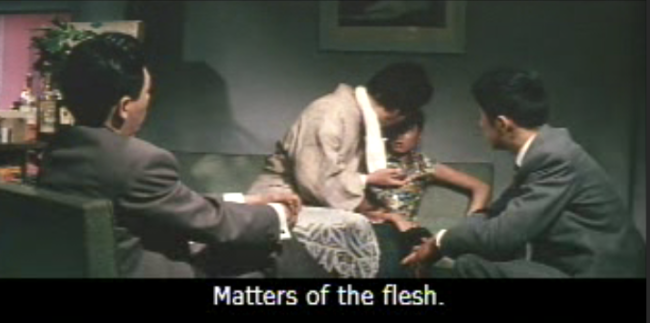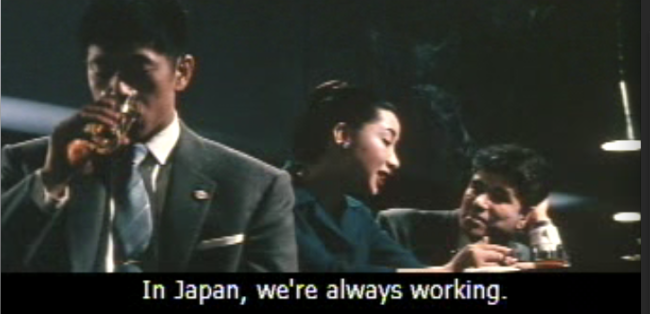Wielding Nishi Yōsuke as the conflicted protagonist, Giants and Toys explores the symbolic exploitation of its characters as they reflect the attitudes of a newly militant consumerist culture. The exploitation of each character reflects a satirical interpretation of postwar Japan in all its allegedly modern glory, with the lack of organic food and life throughout the film underscoring the manufactured nature of “modern” economic principles and overidealized corporate lifestyles.
Kyoko, initially a proletarian girl, is the subject of exploitation who represents idol culture as a manufactured mirror for social reality. Her cultivated rise to fame is the result of manipulation, and during photoshoots, she is treated as a commodity, dragged and thrown around to evoke a sense of sexual exploitation. Moreover, her status as a commodity is explained by Nishi, who rejects her proposal with a scathing retort of “Love? You’re salable goods.”
Despite her exploitation, however, Kyoko chooses to continue being a star, as is seen when she grows into her contrived role and rejects Nishi, declaring, “I’m happy with this puppet’s life.” Her willingness to be exploited is underscored by her enthusiastic acceptance of fans, who bring flowers and symbolically bury Kyoko beneath her own fame.
Kyoko’s newfound stardom is a sharp criticism of the emerging idol culture of the time. The scripted interviews she suffers through expose the excess deliberation involved in her public image. In historical context, Kyoko serves as a “prototype idol.” The duplicity of Kyoko’s transformation from the girl next door to an idol criticizes idol culture as manipulation of the people by corporations who, prompting the audience to emulate idols in their lifestyle choices, effectively shape the culture to their wishes and profit from advertising.
Just as the rise of Kyoko’s stardom is orchestrated behind the scenes, the fetishized salaryman’s life of postwar Japan proves to be an empty promise, with Gōda as a prime example. Though at first glance he appears to be “on the fast track,” as one of his subordinates asserts, his confidence and charisma eventually give way under the strain of the space campaign. As the campaign continues, Gōda overreaches his ability to work and begins taking pep pills and tranquilizers. Gōda’s physical deterioration culminates in the tragic irony of him coughing blood all over his promotion notice.
Likewise, when stripped to his underwear in the ending scene, Goda is surprisingly frail and no longer the powerful image he cut in the opening. His weakened body suggests that all his strength was derived from his business suit, a syncedoche of his business career as a stand-in for his personal life. This is fitting, as we see that his personal life is in tatters; when told of his condition, his wife shows little concern, only emitting a high, bitter laugh and continuing on with her business. Although Gōda’s story can be interpreted as tragedy, the satirical component of his character’s decline is evident when Gōda snarls at Nishi, “Complain to Japan, not me!”, as it effectively pinpoints the Japanese cultural system as the cause of the problem. Gōda is ruined by his loyalty to the company, a principle he clings to until the very end, when he shouts at Nishi, “It’s a company order; you can’t refuse.”
Nishi is also exploited, though his “tranquil” eyes set him apart from Gōda, whose eyes are crazed with desperation by the end of the film. He suffers patronizing slaps and invasive demands from Gōda, including, “Date her. Kiss her. Lay her!” all of which are against his personal desires. However, whereas Gōda is fully immersed in his job and he initially strives to emulate him, the disillusioned Nishi later rejects such an outlook on life. He is shaken by Gōda’s accusation, “You neglected your duty – it’s all your fault!” as he realizes the extent to which work permeates Gōda’s existence and the true expectations of him as a company worker.
Nishi is the character with whom the audience identifies, as he is caught between the extremes of a satisfying life and the power and money he needs to achieve that life. He idolizes and strives to emulate Gōda; yet as the film continues he begins to doubt his superior’s devotion to work, as is seen by his discontent as Gōda lectures on the importance of profit over compassion for Apollo. Conversely, even as he observes Gōda working himself to death for a promotion, Kurahashi refuses to marry Nishi because his salary is too low. At the film’s conclusion, Nishi remains in limbo between his ideals, which suggests that the dilemma of the disillusioned salaryman is one that still perpetrates society.
Only those who remove themselves from the companies they serve, namely Yokoyama and Kurahashi, are happy. Kurahashi makes a point of keeping work and love separate, whereas Nishi interprets the two as the same thing. Likewise, although Yokoyama is initially caught up in the company rivalries, he eventually quits his job. Nishi, on the other hand, only gets as far as threatening to quit before resigning himself to wear the spacesuit, thus maintaining his loyalty to World. The difference between Nishi and the other two is suggested from the trio’s first meeting, during which Yokoyama and Kurahashi complain about work and poke fun at Nishi’s earnest devotion to World. During the scene, Nishi stiffly faces away from the two as they chat, with the lighting varying between him and the others as well to highlight their contrasting ideals.
In addition to the exploitation of archetypal characters, Giants and Toys mocks commodity fetishism in economics as a whole. As Gōda observes the flood of businessmen in the opening scene, he remarks, “To me, they look like caramels.” This statement is representative of the postwar economic mentality, which was largely militant and which bypassed traditional values in favor of economic dominance. The progressive emphasis on acceleration is evident in the spitfire conversation style. Giants and Toys also ridicules the modernized corporate life by showing business executives playing with toys, by which it emphasizes the death of traditional business morals and the advent of a more ruthless mindset of sales over quality. This deterioration is framed by the clicking of the lighter, which not only signals the decline of morals in favor of pecuniary values, but also acts as a metronome to mark the passage of time.
Moreover, the lack of emphasis on quality acts as a parallel to Japanese society. In addition to career overexertion, as represented by Gōda, Giants and Toys depicts the financial hardships of postwar Japan. In the film, the most attractive campaign is Apollo’s straightforward offer to subsidize an entire life, which pinpoints the true problem faced by people in Japan. Yet this need is drowned out by absurdly irrelevant campaigns like “space” and “cute pets,” thus illustrating the disjointed nature of postwar economics.
A sense of cultural subordination also pervades society, as is seen when Gōda introduces his space campaign and dismisses the chief’s protestations by declaring, “America is Japan.” Although the technological modernization of Japan was largely completed prior to and during the war, the effects of the cultural modernization are most prominently seen afterward. The shift from traditional values to an emphasis on profit results in the lack of passion with which companies approach product quality and moral business administration. Most notably, traditional Japanese loyalty to an in-group, or uchi, is reduced to blind, purposeless drudgery in the name of the company, suggesting cultural regression and lack of modernity.
Throughout the film, an overarching motif is the noticeable dearth of organic food; the image of mass-manufactured caramels dominates the movie, as do the synthetic pep pills and tranquilizers that Gōda’s father-in-law, and then Gōda himself, consume at an alarming rate. At first, Kyoko alone shows affiliation with organic food when she is gazing at the sweets in the beginning, and when she enthuses that she will use her 200,000-yen salary to “buy crackers.” Similarly, the image of her feeding her tadpoles is particularly significant because spontaneity initially distinguishes her from the other girls, as the photographer notes. The later deaths of the tadpoles mark the end of Kyoko’s “organic” and genuine nature, an impression reinforced when juxtaposed with Kyoko’s newfound habit of smoking. Similarly, plant and animal life is virtually nonexistent throughout the movie, mirroring the deterioration of life as everything becomes manufactured and ruthlessly economic.
With the clicking lighter constantly superimposed on the screen, Giants and Toys presents a satire of capitalism and cultural subordination in which the exploitation of archetypal characters reflects on the pitfalls of postwar Japan. Through the eyes of Nishi, the salaryman lifestyle is personified and symbolically debunked by Gōda, while Kyoko’s callously acquired celebrity status mimicks the superficial, manipulative nature of idol culture. The fast-paced cinematography of the film mirrors the statement, “If we stop and think, we’ll be crushed,” thus creating an image of Japanese economics accelerating to its inevitable destruction.



